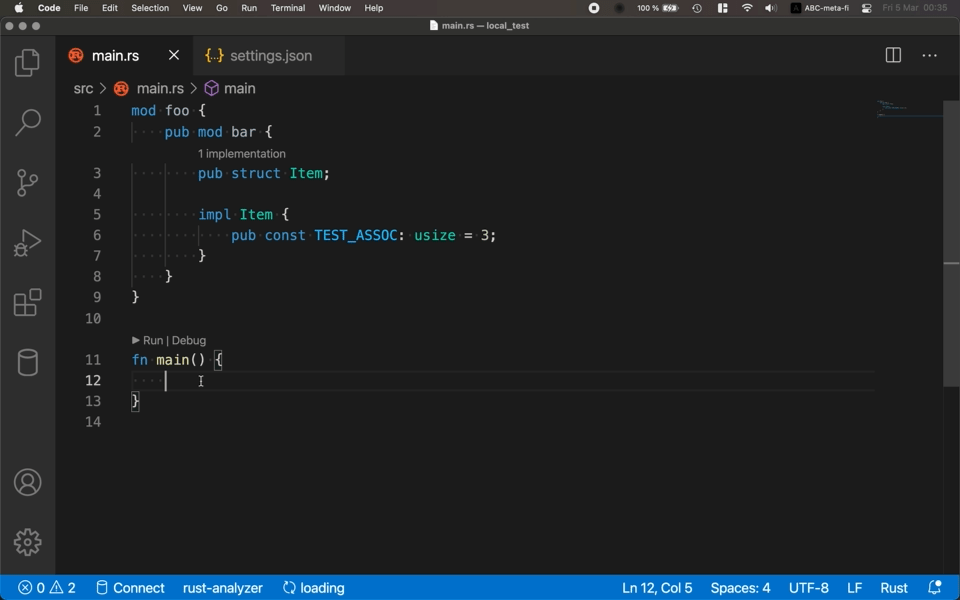7878: Remove `item_scope` field from `Body` r=jonas-schievink a=jonas-schievink
Closes https://github.com/rust-analyzer/rust-analyzer/issues/7632
Instead of storing an `ItemScope` filled with inner items, we store the list of `BlockId`s for all block expressions that are part of a `Body`. Code can then query the `block_def_map` for those.
bors r+
Co-authored-by: Jonas Schievink <jonasschievink@gmail.com>
Co-authored-by: Jonas Schievink <jonas.schievink@ferrous-systems.com>
7873: Consider unresolved qualifiers during flyimport r=matklad a=SomeoneToIgnore
Closes https://github.com/rust-analyzer/rust-analyzer/issues/7679
Takes unresolved qualifiers into account, providing better completions (or none, if the path is resolved or do not match).
Does not handle cases when both path qualifier and some trait has to be imported: there are many extra issues with those (such as overlapping imports, for instance) that will require large diffs to address.
Also does not do a fuzzy search on qualifier, that requires some adjustments in `import_map` for better queries and changes to the default replace range which also seems relatively big to include here.

7933: Improve compilation speed r=matklad a=matklad
bors r+
🤖
Co-authored-by: Kirill Bulatov <mail4score@gmail.com>
Co-authored-by: Aleksey Kladov <aleksey.kladov@gmail.com>
7898: generate_function assist: infer return type r=JoshMcguigan a=JoshMcguigan
This PR makes two changes to the generate function assist:
1. Attempt to infer an appropriate return type for the generated function
2. If a return type is inferred, and that return type is not unit, don't render the snippet
```rust
fn main() {
let x: u32 = foo$0();
// ^^^ trigger the assist to generate this function
}
// BEFORE
fn foo() ${0:-> ()} {
todo!()
}
// AFTER (only change 1)
fn foo() ${0:-> u32} {
todo!()
}
// AFTER (change 1 and 2, note the lack of snippet around the return type)
fn foo() -> u32 {
todo!()
}
```
These changes are made as two commits, in case we want to omit change 2. I personally feel like it is a nice change, but I could understand there being some opposition.
#### Pros of change 2
If we are able to infer a return type, and especially if that return type is not the unit type, the return type is almost as likely to be correct as the argument names/types. I think this becomes even more true as people learn how this feature works.
#### Cons of change 2
We could never be as confident about the return type as we are about the function argument types, so it is more likely a user will want to change that. Plus it is a confusing UX to sometimes have the cursor highlight the return type after triggering this assist and sometimes not have that happen.
#### Why omit unit type?
The assumption is that if we infer the return type as unit, it is likely just because of the current structure of the code rather than that actually being the desired return type. However, this is obviously just a heuristic and will sometimes be wrong. But being wrong here just means falling back to the exact behavior that existed before this PR.
Co-authored-by: Josh Mcguigan <joshmcg88@gmail.com>
7891: Improve handling of rustc_private r=matklad a=DJMcNab
This PR changes how `rust-analyzer` handles `rustc_private`. In particular, packages now must opt-in to using `rustc_private` in `Cargo.toml`, by adding:
```toml
[package.metadata.rust-analyzer]
rustc_private=true
```
This means that depending on crates which also use `rustc_private` will be significantly improved, since their dependencies on the `rustc_private` crates will be resolved properly.
A similar approach could be used in #6714 to allow annotating that your package uses the `test` crate, although I have not yet handled that in this PR.
Additionally, we now only index the crates which are transitive dependencies of `rustc_driver` in the `rustcSource` directory. This should not cause any change in behaviour when using `rustcSource: "discover"`, as the source used then will only be a partial clone. However, if `rustcSource` pointing at a local checkout of rustc, this should significantly improve the memory usage and lower indexing time. This is because we avoids indexing all crates in `src/tools/`, which includes `rust-analyzer` itself.
Furthermore, we also prefer named dependencies over dependencies from `rustcSource`. This ensures that feature resolution for crates which are depended on by both `rustc` and your crate uses the correct set for analysing your crate.
See also [introductory zulip stream](https://rust-lang.zulipchat.com/#narrow/stream/185405-t-compiler.2Fwg-rls-2.2E0/topic/Fixed.20crate.20graphs.20and.20optional.20builtin.20crates/near/229086673)
I have tested this in [priroda](https://github.com/oli-obk/priroda/), and it provides a significant improvement to the development experience (once I give `miri` the required data in `Cargo.toml`)
Todo:
- [ ] Documentation
This is ready to review, and I will add documentation if this would be accepted (or if I get time to do so anyway)
Co-authored-by: Daniel McNab <36049421+DJMcNab@users.noreply.github.com>
7892: Fix TokenStream::from_str for input consisting of a single group with delimiter r=edwin0cheng a=kevinmehall
TokenStream holds a `tt::Subtree` but assumes its `delimiter` is always `None`. In particular, the iterator implementation iterates over the inner `token_trees` and ignores the `delimiter`.
However, `TokenStream::from_str` violated this assumption when the input consists of a single group by producing a Subtree with an outer delimiter, which was ignored as seen by a procedural macro.
`tt::Subtree` is just `pub delimiter: Option<Delimiter>, pub token_trees: Vec<TokenTree>`, so a Subtree that is statically guaranteed not to have a delimiter is just `Vec<TokenTree>`.
Fixes#7810Fixes#7875
Co-authored-by: Kevin Mehall <km@kevinmehall.net>
7865: preserve escape sequences when replacing string with char r=Veykril a=jDomantas
Currently it replaces escape sequence with the actual value, which is very wrong for `"\n"`.
Co-authored-by: Domantas Jadenkus <djadenkus@gmail.com>